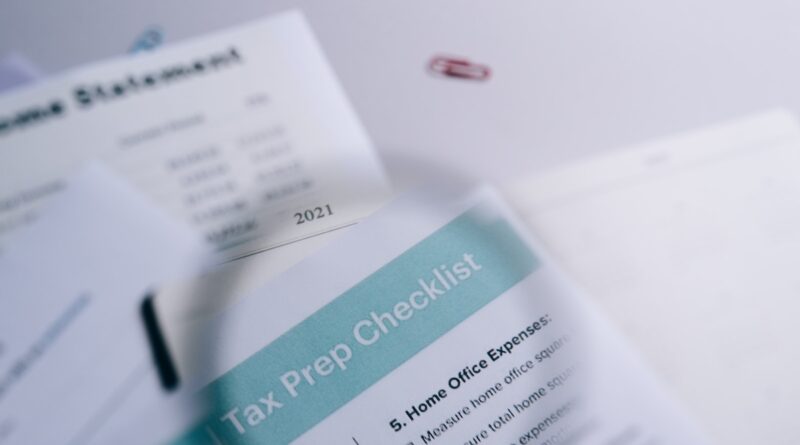Tax Checklist for Real Estate Partnerships: A Comprehensive Guide to Avoid Headaches
Tax season can be a stressful time, especially when it comes to real estate partnerships. With complex tax laws and numerous forms to file, it’s essential to be prepared to avoid costly mistakes and ensure compliance. As a real estate investor, borrower, or lender, tax compliance is critical for your financial success. That’s why we’ve created this comprehensive tax checklist for real estate partnerships to help you stay organized and minimize your tax liability.
Are you ready to navigate the tax season with ease? Our tax checklist provides a step-by-step guide to help you prepare your financial records, file the correct tax forms, and review your tax return for accuracy and completeness. By following this checklist, you can avoid costly mistakes, minimize your tax liability, and ensure compliance with the tax laws. Let’s get started!
Why You Should Read This Checklist?
Reading this tax checklist for real estate partnerships will give you a clear understanding of the tax obligations for your partnership. You will learn about the essential tax forms you need to file, the deadlines you need to meet, and the deductions you can claim. By following this checklist, you will reduce the risk of making costly errors or omissions on your tax returns.
Overview of the Checklist
The tax checklist for real estate partnerships is divided into three sections:
- Preparation
- Filing
- Post-Filing
Each section includes several tips to help you stay organized and minimize your tax liability.
1. Preparation
Preparation is the key to a successful tax season. Here are some tips to help you prepare:
Create a Checklist of Documents
Make a list of all the documents you need to prepare your tax return, including income statements, expense receipts, and partnership agreements. Keep track of the documents you receive and make sure they are complete and accurate.
Real estate partnerships are required to file a tax return annually. The tax return is required to report all the partnership’s financial transactions for the year, including income and expenses. To prepare the tax return, you will need to gather all the necessary documents, such as:
- Income statements, including rental income, interest income, and any other income received by the partnership
- Expense receipts, including property maintenance, repairs, and improvements
- Partnership agreements
- Loan agreements
- Tax ID numbers for the partnership and each partner
- Any other relevant financial documents
Organize Your Records
Organize your financial records by category, such as income, expenses, and deductions. Use a spreadsheet or accounting software to track your transactions and generate reports.
Organizing your financial records will make it easier to prepare your tax return and ensure that you don’t miss any deductions or credits. Here are some tips for organizing your records:
- Use a spreadsheet or accounting software to track your transactions
- Categorize your transactions by income, expenses, and deductions
- Generate reports to review your transactions by category
- Store all your financial documents in a secure and organized location
Meet with Your Tax Advisor
Consult with your tax advisor to discuss your partnership’s tax obligations, deductions, and credits. Review your financial records and make any necessary adjustments.
Real estate tax laws are complex, and it’s essential to consult with a tax advisor who is experienced in real estate taxation. Here are some things to discuss with your tax advisor:
- Your partnership’s tax obligations
- The tax forms you need to file
- The deadlines for filing your tax return and paying any taxes owed
- The deductions and credits you can claim
- The tax strategies you can use to minimize your tax liability
Meeting with your tax advisor will help ensure that you are aware of all your partnership’s tax obligations and that you are taking advantage of all the deductions and credits available to you. Your tax advisor can also provide guidance on tax planning strategies for future years.

2. Filing
Once you have prepared your financial records, it’s time to file your tax return. Here are some tips to help you file your tax return accurately:
File the Correct Tax Forms
Real estate partnerships are required to file Form 1065, U.S. Return of Partnership Income, annually. This form is used to report the partnership’s income, deductions, and credits. The partnership does not pay tax on its income. Instead, the partnership’s income and deductions are passed through to the partners, who report them on their individual tax returns.
Partnerships with foreign partners or income may also need to file Form 8865, Return of U.S. Persons With Respect to Certain Foreign Partnerships.
Pay Attention to Filing Deadlines
The deadline for filing Form 1065 is March 15th for calendar-year partnerships. If you cannot file by this date, you can request a six-month extension by filing Form 7004, Application for Automatic Extension of Time to File Certain Business Income Tax, Information, and Other Returns.
It’s essential to pay attention to the filing deadlines to avoid penalties and interest on any taxes owed. If you are unsure about the filing deadline or need to request an extension, consult with your tax advisor.
Report All Income and Expenses
Report all the partnership’s income and expenses on Form 1065. Income includes rental income, interest income, and any other income received by the partnership. Expenses include property maintenance, repairs, and improvements, as well as any other expenses incurred to generate income.
Be sure to report all income and expenses accurately to avoid penalties and interest on any taxes owed. If you are unsure about how to report a particular item, consult with your tax advisor.
Claim All Deductions and Credits
Claim all the deductions and credits available to you on Form 1065. Deductions include expenses incurred to generate income, such as property maintenance, repairs, and improvements. Credits include tax credits for energy-efficient improvements, such as solar panels or geothermal systems.
Be sure to claim all deductions and credits accurately to minimize your tax liability. If you are unsure about which deductions or credits apply to your partnership, consult with your tax advisor.
Check for Errors and Omissions
Review your tax return for errors and omissions before filing. Check that all the information is accurate and complete, and that all the necessary schedules and attachments are included.
Checking for errors and omissions will help avoid penalties and interest on any taxes owed. If you are unsure about how to complete a particular section of your tax return or need to make a correction, consult with your tax advisor.
3. Post-Filing
After you have filed your tax return, it’s essential to review your return for accuracy and completeness. Here are some tips to help you review your tax return:
Check for Errors and Omissions
Review your tax return for errors and omissions. Check that all the information is accurate and complete, and that all the necessary schedules and attachments are included.
Checking for errors and omissions will help avoid penalties and interest on any taxes owed. If you discover an error or omission, file an amended tax return as soon as possible.
Pay Any Taxes Owed
If you owe any taxes, pay them as soon as possible to avoid penalties and interest. The IRS offers several payment options, including online payments, check or money order, and electronic funds withdrawal.
If you are unable to pay your taxes in full, contact the IRS to discuss your options, such as an installment agreement or an offer in compromise.
Review Your Tax Strategy for Next Year
Review your tax strategy for the next year with your tax advisor. Discuss any changes in your partnership’s business or investment activities that may affect your tax liability.
Planning ahead will help you minimize your tax liability and avoid surprises at tax time. Your tax advisor can provide guidance on tax planning strategies and opportunities for deductions and credits.
Examples of Tax Checklist for Real Estate Partnerships
Here are some examples of how you can use this tax checklist for real estate partnerships:
- Scenario 1: You are a real estate investor who owns a partnership that owns several rental properties. You need to file a tax return for your partnership. You use this tax checklist to prepare your financial records, file the correct tax forms, and claim all applicable deductions and credits.
- Scenario 2: You are a lender who provides financing for real estate partnerships. You use this tax checklist to ensure that your borrowers are compliant with the tax laws and minimize your risk of loan defaults due to tax issues.
- Scenario 3: You are a real estate borrower who has formed a partnership to finance a property acquisition. You use this tax checklist to prepare your partnership’s tax return, reduce your tax liability, and avoid penalties for late filings or errors.
Final Words
As a real estate investor, borrower, or lender, tax compliance is essential for your financial success. By following this tax checklist for real estate partnerships, you can avoid headaches and stay organized during tax season. Remember to prepare your financial records, file the correct tax forms, and review your tax return for accuracy and completeness. If you have any questions or concerns, consult with your tax advisor.
Are you ready to prepare your tax return for your real estate partnership? Use this tax checklist to stay organized and minimize your tax liability. Share this article with your partners, borrowers, or lenders to help them avoid headaches and stay compliant with the tax laws.
